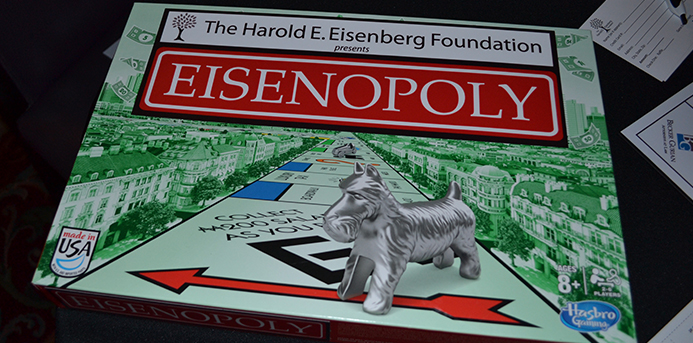The associate board of the Harold E. Eisenberg Foundation knows how to throw a fabulous party—and a successful one at that. The board hosted its annual fundraiser, “Eisenopoly,” on Jan. 23 at the Walnut Room on State Street, and it sold out for the 6th year in a row to 500 guests.
The foundation supports Gastrointestinal Cancer Research, and was established in 1999 when the Eisenberg family, from Highland Park, tragically lost their father, Harold, to liver cancer.
The party always has a Monopoly theme to tie in Harold Eisenberg’s real-estate development background. Harold’s niece came up with the idea. Personalized “Eisenopoly” board games serve as the centerpieces of every table. The emcee, dressed as Mr. Monopoly, grew out a mustache just for the occasion. A cotton candy machine, DJ, catering by Hub 51, photo booth with Monopoly-themed props, and signature cocktails all bring the event strong personality and pizzazz.
“It’s such a fun event for everyone,” says Lesley Kiferbaum (maiden name Eisenberg), daughter of Harold and president of the foundation’s associate board. “Each year we try and make it a little better.”
The associate board started in 2001 as a meeting of Harold’s children and their friends sitting around a table, and it has grown to include young men and women, who are participants in the foundation’s real estate mentorship program, and who never knew Harold.
“I look around the room and nobody knew my dad personally,” Kiferbaum says. “The quality of people and the amount of time, dedication and effort that they put into it every month to make the programs successful—it is so incredibly inspiring.”
She says seeing the board’s passion and dedication is a tribute to the relationships her father built with his family, friends and colleagues.
[easyrotator]erc_46_1423760750[/easyrotator]
The Foundation
HEEF is one of the nation’s largest private organizations committed to gastrointestinal cancer research. The foundation has an executive board and associate board. There is also an entire side of the foundation dedicated to real estate education with mentorship and scholarship programs for high school and college students, as well as a speaker series. Many of the participating students are on the associate board and in attendance at “Eisenopoly.”
Next to the bar at “Eisenopoly,” a power point slideshow, which includes facts about gastrointestinal cancer, as well as Harold’s story and his photo, reminds guests why they came.
Gastrointestinal cancer affects the digestive organs including the colon, rectum, stomach, liver, pancreas, esophagus, gallbladder and small intestine.
According to the GI Cancer Institute, in 2011 more people died of GI cancers than from breast cancer and prostate cancer combined. The institute states that the five-year survival rate for these cancers is extremely low. Harold Eisenberg was diagnosed with liver cancer and passed away within 10 days.
A Different Outcome
The day Kiferbaum was interviewed for this story was the 15th anniversary of her father’s death. She recalls the time before he got sick: They had just been on vacation in Florida and her father had seemed perfectly healthy, running three miles a day. He had been complaining a little about some back pain, but Kiferbaum says he had been at the Mayo Clinic six months before and had received a clean bill of health.
When he went home and visited the doctor, they found his liver completely covered in cancer.
“We said, okay, well we’ll get a liver transplant,” Kiferbaum says. “The next day the doctors said, ‘No, it has spread to your entire body and there is nothing we can do.’”
“My dad was an extremely strong person—he was strong-willed and he was fighter,”Kiferbaum says. The family reached out to every doctor in the country they could. They ended up connecting with Dr. Al Benson at Northwestern Memorial Hospital.
In the end, Kiferbaum says the cancer progressed so quickly that there was nothing that could be done, but Harold’s family developed a relationship with Benson and they have been working to fund his research at the Robert H. Lurie Comprehensive Cancer Center since.
“I say all the time it was the worst thing that could have ever happened to me or my family,” Kiferbaum says. “But we were so close and we never wanted any other family to go through what we went through.”
She says they have seen drastic changes and advances in GI cancer research since they started fundraising in 1999. There has been a move toward very personalized, targeted treatments, which are more effective.
According to the Robert H. Lurie Comprehensive Cancer Center, the Eisenberg foundation has helped raise more than $1 million to fund GI cancer research at Northwestern.
“I hope that as we continue to raise more money and put our efforts into fighting these devastating diseases that somebody will have a different outcome,” Kiferbaum says.

